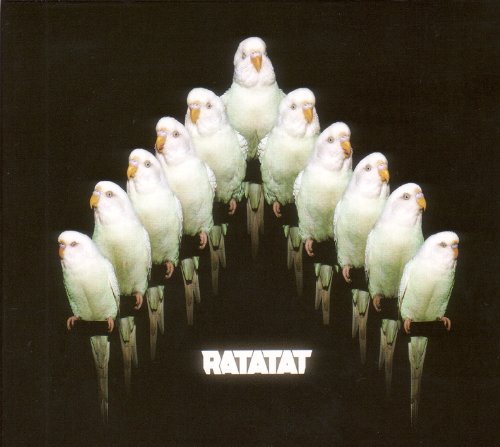
Ratatat
LP4
Release Date: Jun 8, 2010
Genre(s): Electronic
Record label: XL
Music Critic Score
How the Music Critic Score works
Album Review: LP4 by Ratatat
Very Good, Based on 10 Critics
Based on rating 9/10
In 1999, before we started getting used to the idea of French-style house leading hipsters in droves onto dancefloors, Ratatat began whetting certain prescient appetites with gossamer dance tracks that sounded as if they had been grounded against gravel. It was that unswerving balance between a majestic tunefulness – theirs in particular articulated by a nous for classical music – and a cutting edginess that made Ratatat something of a precursor to the likes of Digitalism and Justice. Moreover, tracks like “Lex” and “Seventeen Years”, where pearlescent guitar hooks beamed in surprising comfort with Bach-like curlicues showed us that the Brooklyn duo could play Daft Punk at their own game, and then some.
Based on rating 83%%
With LP4, Ratatat creates yet another sloping soundscape despite similarities to 2008’s LP3, which was recorded during the same studio session. On this album, the melancholic undertones of LP3 are taken to new levels as slower tracks like “We Can’t Be Stopped” and “Mahalo” act as sonic valleys to otherwise mountainous tunes—as evidenced by openers “Bilar” and “Bob Gandhi,” which incorporate resounding crescendos and afro beats. After traveling through dance thumps and mellow-island rhythms, the album slows and fades in closing track “Alps,” leaving you with that drowsy, drifting-out-to-sea feeling.
Based on rating 8/10
A fun part of music consumption in the digital age is the blossoming art of genre-nomenclature. A quick sniff around the blogosphere reveals a world where bands kicking up similar noise on opposite sides of the planet can be instantly stamped with a newly-minted classification. Perhaps it’s humbling then, to rewind 40 years and give reverence to the likes of Juan Garcia Esquivel, whose zany instrumental pop would later be exquisitely referred to as ‘space-age bachelor-pad music.’ Ratatat understand what Esquivel was getting at perfectly, and have spent the last nine years channelling that same spirit of relentlessly ear-catching instrumental future-pop.
Based on rating 8/10
Anyone expecting much of a change on Ratatat’s fourth album will be disappointed. Steady as she goes for the duo of Mike Stroud and Evan Mast on LP4, which is good news for anyone who’s fallen in love with the sound of their previous work. Their trademark sound of chunky rhythms, soaring guitar harmonies, 8-bit textures, and sunny, catchy melodies remains fully intact, and the minor innovations of LP3 remain as well.
Based on rating 3.5/5
The fact that Ratatat’s [b]‘LP3’[/b] has been followed in turn by [b]‘LP4’[/b] gives away their guiding principle: ‘Make the same album. Make it better.’ There are no ‘feat. Gucci Mane’ rebrandings here. In one sense ‘LP4’ is interchangeable with the rest of their output: tasteful, downbeat, wordless world music-flecked indietronica that hasn’t fallen too far from the Gore-Tex-clad backpacker hip-hop family tree of DJ Shadow.
Based on rating 3/5
On LP4, Ratatat's appropriately named follow-up to LP3, the New York City duo of guitarist Mike Stroud and producer/synth player Evan Mast basically re-fry their trademark instrumentals and sprinkle them with the occasional vocal interlude (in this case a clip from a Herzog film and others from a conversation with actor Linda Manz). [rssbreak] Considering that the album arose from the same Old Soul Studio recording sessions as LP3, similarities are to be expected. The only real evolution is the use of a full string section.
Based on rating 5.2/10
Wherever you stand with Ratatat, they can't be accused of inconsistency. The New York duo of Mike Stroud and Evan Mast has been stylish and functional from the start, right down to their name, which expresses the same concussive energy as their stomping hooks. Their sound-- slick electro-pop infused with hip-hop-- emerged fully formed on their 2004 self-titled debut, quickly making them a highly recognizable brand, and six years on, it retains the vitality that made it click in the first place.
Based on rating 2/5
Maybe this was inevitable. Nobody has really been denying that Ratatat’s trade is in immediate gratification. And when that’s the case, it’s a difficult feat not to burn out pretty quickly. 2008’s LP3, though weak, served at least to reassure Ratatat’s audience that the band doesn’t want to stagnate; you can’t rewrite “17 Years” forever, after all, and it’s admirable that they chose not to.
Opinion: Excellent
Thankfully Ratatat are more creative in their music than they are in choosing titles for their records. The duo of guitarist Mike Stroud and programmer/multi-instrumentalist Evan Mast may not be adept at naming their albums but they are skilled musicians and have managed to settle into a discriminate groove by combining elements of classical, jazz, electronica and guitar-rock into an interesting and unique musical hybrid. As the title suggests, this is the duo’s 4th LP, and although it lacks the raw energy of the band’s self-titled debut, it shows a continuing evolution on the distinctive guitar and bass hooks that form the foundation of their signature sound.
Opinion: Mediocre
Never mind the hype. Sleigh Bells offers little more than a Barbie version of M.I.A., fitting given that the Brooklyn duo signed to the controversial rapper's vanity label. Producer Derek Miller crafts aggressive instrumentals with street-sweeper riffs and dirty house beats, as if trying to single-handedly end the loudness wars, while Alexis Krauss cheers from the sidelines with bubblegum vocals.

